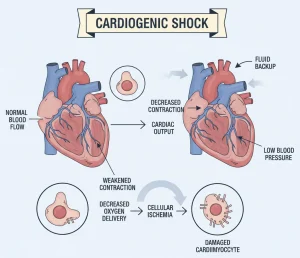Overview
Diagnosis
Cardiogenic shock occurs when the heart cannot pump enough blood to meet the body’s needs, often due to a severe heart attack or heart failure. Diagnosis is usually made quickly in emergency settings.
Common diagnostic steps include:
-
Physical examination: Checking for low blood pressure, rapid heartbeat, cool and clammy skin, and signs of poor organ perfusion
-
Electrocardiogram (ECG or EKG): Identifies heart rhythm problems or heart attack
-
Blood tests: Measure cardiac enzymes, lactate, and kidney/liver function
-
Echocardiogram: Assesses heart pumping ability and structural abnormalities
-
Chest X-ray: Detects fluid in the lungs or heart enlargement
-
Hemodynamic monitoring: Invasive techniques like a pulmonary artery catheter may measure heart pressures and guide treatment
Early diagnosis is critical to prevent organ failure and improve survival.
Treatment
Cardiogenic shock is a medical emergency and requires rapid intervention. Treatment options may include:
-
Medications:
-
Inotropes and vasopressors to strengthen heart contractions and maintain blood pressure
-
Diuretics to reduce fluid overload
-
-
Oxygen therapy: To improve oxygen delivery to tissues
-
Mechanical support devices:
-
Intra-aortic balloon pump (IABP)
-
Ventricular assist devices (VADs)
-
Extracorporeal membrane oxygenation (ECMO) in severe cases
-
-
Revascularization procedures:
-
Angioplasty or stent placement to open blocked coronary arteries
-
Coronary artery bypass surgery (CABG) if needed
-
-
Fluid management: Careful balancing
Advertisement

